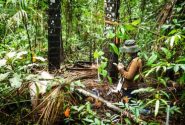Results from a new CIFOR survey suggest that forest managers and policymakers do not perceive climate change as a major threat to production forests in tropical countries.
This perception may be impacting on implementation measures to facilitate the adaptation of tropical production forests to climate change, it says.
“The fact that climate change ranked below other threats to forests [in the survey] explains why respondents rarely consider climate change in their long-term forest planning and management,” said CIFOR scientist Manuel Guariguata, co-author of Adapting tropical production forests to global climate change: risk perceptions and actions.
“Sustainable forest management is threatened by climate change, which puts forests at a greater risk of facing droughts, flooding, fire and temperature increase,” added Centre de coopération internationale en recherche agronomique pour le développement (CIRAD) and CIFOR scientist Bruno Locatelli, Guariguata’s co-author. “Adaptation measures will be needed to maintain the productive capacity of tropical forests.”
The survey, which was conducted on both natural and planted forests in tropical parts of Africa, the Americas, Asia and the Pacific, aimed to achieve a better understanding of how tropical forest management is influenced by environment officials’ perceptions of climate change. It received 152 responses from forest management officials.
Implementing climate-change adaptation measures to sustain productivity plays a key role in ensuring income in forestry sectors and forest-dependent communities, the report says. These measures include fire prevention, biodiversity enhancement, silvicultural or forest management practices and pest control, among others.
However, the survey shows that climate change adaptation measures that would ensure the continued productivity of forests were rarely implemented by most forest managers. Of the adaptations that had already been implemented in tropical forests, most were installed in anticipation of perceived risks, such as fire, rather than in anticipation of climate change.
Respondents also said that information on climate change, its impacts and adaptation practices were not easily accessible. Fifty-three percent of participants were under the impression that published national guidance for forest management was not available.
Additionally, more than 50 percent of respondents did not know what adaptation practices were, though those who associated themselves with forest management were marginally more aware of these practices, he added.
“If respondents were aware of management practices for adapting forests to climate change or if they perceived that practices were available, they were more likely to implement them,” Locatelli said in regard to both natural and planted production forests.
Many respondents also said that a lack of funds and financial capacity were major obstacles to implementing adaptation measures. Without proper funding and national guidance, adaptation measures such as pest or fire control are difficult to put into practice.
“Like in any convenience sampling, no reliable statement can be made on whether the sample is representative of the whole population,” said Guariguata. “The results of this survey only provide initial insights into how climate considerations are being anticipated in tropical forest management.”
We want you to share Forests News content, which is licensed under Creative Commons Attribution-NonCommercial-ShareAlike 4.0 International (CC BY-NC-SA 4.0). This means you are free to redistribute our material for non-commercial purposes. All we ask is that you give Forests News appropriate credit and link to the original Forests News content, indicate if changes were made, and distribute your contributions under the same Creative Commons license. You must notify Forests News if you repost, reprint or reuse our materials by contacting forestsnews@cifor-icraf.org.












